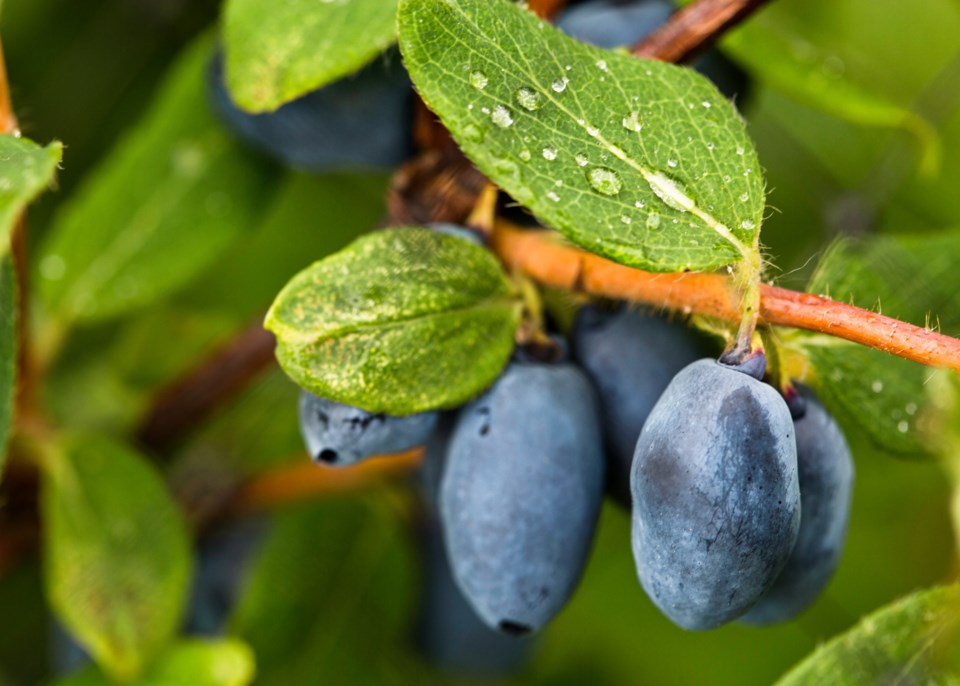It's tangy, high in antioxidants and growing in a farmer's field near you.
Haskap berries are one of the latest fruits being grown in southern Ontario and Wellington County. Also called the blue honeysuckle or the honeyberry, it is described as tasting like a cross between a blueberry and raspberry. They are sold fresh, frozen, in a powder or in other products.
Growing two weeks before strawberry season, haskap berries can be found locally at Strom's Farm and Bakery west of Guelph and Marcy's Berries in Puslinch.
Nora Marcy and her husband, Keith, bought haskap berry bushes 10 years ago as a retirement project. They grow an acre with five varieties of haskap berries and offer them through pick-your-own in June.
Over the years, Marcy said reaction to the fruit has varied widely. They offer a sample bowl for people to try before buying.
“Some buy a pint out of curiosity and some people will pick 20 pounds worth and come back for more the next day,” said Marcy.
Amy Strom of Strom's Farm and Bakery said a lot of their customers don't know what a haskap berry is.
"That question, 'What's a haskap?' You'll hear that question get answered all day at the farm," said Strom. "It's another incredible fruit that is very high in antioxidants, the new super fruit."
Strom's bought haskap bushes back in 2014 when they were looking to add a fruit crop to their farm. Today, they have half an acre offering five different varieties of haskap berries, which they use to make a haskap tart, vinaigrette and spread.
"We were learning about haskaps, and they do not need irrigation, they do not need to be replanted every three years," said Strom.
Besides being eaten, the fruit is used in alcohol production. Kris Burley, president of the Haskap Berry Growers Association of Ontario (HBGAO) said the berry maintains a purple-pink colour. Strom's haskap berries are used in a haskap liquer created by Spring Mill Distillery.
“It’s sought after because that’s something new to the alcohol industry and it’s a natural colouring," said Burley, adding it is used by cideries, breweries and distilleries.
Haskap berries grow in boreal regions, which include countries like Russia, Poland and Japan. The berry also grows naturally in parts of Ontario and across Canada. Haskap growers can be found in Nova Scotia, Quebec, Alberta and Saskatchewan.
"You can consider it a very Canadian fruit," said Tom MacIntosh, liaison for Ontario for Haskap Canada Association.
In Saskatoon, the University of Saskatchewan grows and sells haskap plants through its fruit program. The breeding program was created by U of Sask assistant professor in plant sciences, Bob Bors.
“In the wild, they’re not that appealing, they’re quite nasty to be honest, it was through the breeding from Dr. Bob Bors that we get this powerful berry,” said MacIntosh.
With a similar climate to Japan, southern Ontario is known for producing large, plump and sweet haskap berries. Growers weren't initially sure the fruit was going to survive the hot weather of southern Ontario.
“It’s a great berry to grow, all our organization members have no issue growing the berry,” said Burley, who has association members from as far south as the Windsor area to northern Ontario.
While they can be easy to maintain, some growers can struggle to grow haskap berries in the first two years of the plant's life. MacIntosh said new growers are being advised to plant haskap berry saplings in plastic to prevent them from being out competed by other plants.
“They can be simply out competed by the grass in our lawns,” said MacIntosh.
Marcy said her and Keith experienced challenges when they began growing haskap bushes, including dealing with cedar waxwings, who eat the fruit.
"We have some healthy birds," said Marcy, who keeps netting over the plants during the harvest period.
Growers agree more education is needed for consumers to recognize the berry and its potential health benefits. Burley said the HBGAO is partnering with the University of Guelph and other schools across Canada to study haskap berries. Dalhousie University has been studying the health benefits of haskap berries as early as 2015.
“It’s a high demand, it’s a good demand, but it’s an unknown product,” “I’ve run into issues where I’ve had to introduce haskap berry to distilleries who haven’t heard of the berry, and their sole market is fresh fruit.” said Burley.
“We’re doing a lot of research with all there universities and colleges with our berries, trying to get the word out there."



